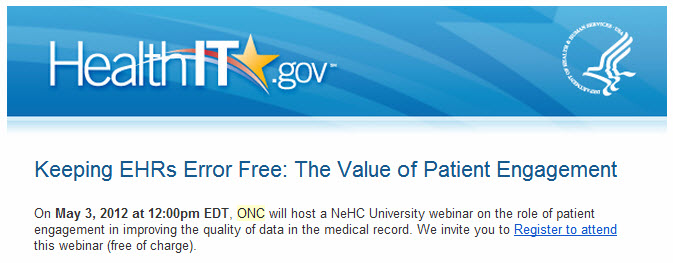I should have announced this long ago but I’ve just been too busy for my own good. Go register now! FREE! Attendance is limited to 1,000. (It’ll be archived online of course.) Or click the graphic to register:
Why this matters: Data quality is important, and it’s not guaranteed.
As long-time readers (and members of our Society) know, the quality of the data in your medical record is important, and it’s often not well managed at all: it’s quite common for family to discover errors or omissions. In some cases the mistakes can be lethal. The case for Patient Engagement is clear: do you know what’s in your record? Someday a health worker may look in the record, and if the wrong info is there, harm could result.
You could say: the good news is, medicine is finally computerizing. The bad news is, there might be grit in the database. Time to get to work and clean it up!
Wonderfully, our current administration’s health IT people (ONC) get it, and are publicizing the issue.
One step is today’s webinar, “Keeping EHRs Error Free: The Value of Patient Engagement.” (I’m not sure I agree that “keeping” is the right word, but politics is politics – you know what you need to do!) There’s a great roster of speakers:
FEATURING
- Erin Poetter – Consumer e-Health Policy Analyst, Office of the National Coordinator for Health IT (ONC)
- e-Patient Dave deBronkart – Patient Advocate, co-chair, Society for Participatory Medicine
- Prashila Dbullah – Project Lead, NORC at the University of Chicago (“social science research that supports informed decision making”)
- Norman K. Sondheimer – Co-Director of the Electronic Enterprise Institute (EEI), University of Massachusetts Amherst
- Ethan Katsch* – Professor of Legal Studies and Director, Center for Information Technology and Dispute Resolution (CITDR)
- Kenneth Mandl – Associate Professor at Harvard Medical School; Director of the Intelligent Health Laboratory at the Children’s Hospital Informatics Program
*See footnote at bottom about “Katsch”
I’m thrilled that ONC chose to start this webinar with the voice of SPM, to set the context for all that follows. Compare that to a few years ago, when the patient voice would be an afterthought if it appeared at all.
Ethan’s a particularly interesting guy, to me. I first met him in 2009, when the news broke about the mess I found in my insurance billing history, which ended up on the front page of the Boston Globe. Ethan was (is?) a patient at the same hospital, and, fascinatingly, he was also a world leader of the project – in finance – to let consumers identify errors in their credit card statements.
And get them fixed.
So, if you look at online credit card statements, y’know the thing where it says “Inquire or dispute this item”? He led the work to define the global process for managing such inquiries: how you report them, how the data custodian has to respond, how it all gets resolved eventually.
Well, now the same work is starting regarding our medical records. Considering the many people who’ve told me they can’t get their errors fixed, this will be important work!
During the prep for this I was also thrilled to learn that Children’s Hospital Boston (Ken Mandl) has been doing world-leading work to empower family feedback in maintaining the quality of the record. For one thing, I didn’t know anyone was being this proactive about it. For another, I’ve been suspecting for more than a year that parents of sick children might be the most potent force for change in healthcare.
So, listen in live, or view the archive. It’s important work, both technically and culturally, and of course for patient safety.
— Oh, one more thing: unlike in finance, this is NOT just about the consumer’s rights to accurate data: this can seriously affect health workers, too. Have you ever had a situation in your job where somebody gave you wrong information, and something went wrong? Well, in healthcare that can cause a well trained person to cause harm, which is a horrible, horrible thing. Doctors and nurses deserve clean data, too.
Patients can help. Let patients help.
_______________
* About Ethan Katsch … make that Katsh, no c. How perfect that the announcement of a data quality webinar would contain a typo…. and Ethan says he never got around to having them fix it, so I pasted it in here – exactly the way errors get perpetuated in our medical records.
Ethan just learned again: fix it now, before someone passes it along to others. Bad data is an infectious disease.







Recent Comments